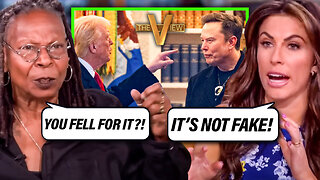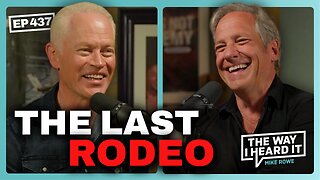Premium Only Content

Venezuela Is The New Cuba
The US policy toward Venezuela is very similar to the policy that it has had towards Cuba since the 1960s.
We stream our live show every day at 12 PM ET.
We need your help to keep providing free videos! Support the Majority Report's video content by going to http://www.Patreon.com/MajorityReport
Watch the Majority Report live M–F at 12 p.m. EST at youtube.com/samseder or listen via daily podcast at http://Majority.FM
Download our FREE app: http://majorityapp.com
SUPPORT the show by becoming a member: http://jointhemajorityreport.com
We Have Merch!!! http://shop.majorityreportradio.com
LIKE us on Facebook: http://facebook.com/MajorityReport
FOLLOW us on Twitter: http://twitter.com/MajorityFM
SUBSCRIBE to us on YouTube: http://youtube.com/SamSeder
Emma: In terms of using Venezuela for his election strategy. A lot of that depends on the fact that socialism as a concept has a brand cachet that can be used for domestic purposes by right-wing organizations here in the US. But in terms of how it was used in Venezuela as well for their domestic politics, that's something that I really want to get into as well. but you know you mentioned u.s sanctions there and how the effect of u.s sanctions I'm particularly interested in that as a podcast based in the united states how did that affect the fact that there is as you say no money in Venezuela exacerbating the economic collapse that happened in the mid-2010s.
Guest: well it comes in stages because of the fire I mean the way that the economic crisis begins in Venezuela is actually when Chavez is running for reelection in 2012. and they're borrowing billions of dollars. they're spending as much money as they can to juice the economy up. so that they can get this sort of sick and dying Chavez across the finish line and win the election. which they do. but by now the economy's in trouble because there's all these you know there's tremendous you know all this deficit spending the economy is too hot. and then Maduro comes in and he doesn't know how to handle it. and he sort of you know continues with a bunch of policies that need to be changed. but he's too uncertain to make any changes. and then the price of oil drops and they run out of money. not good. and then Trump comes into office and trump starts hitting Venezuela with these you know with these general sanctions. there's two kinds of sanctions. there's individual ones against you know bad guys. or perceived bad guys. and then there's general sanctions that hit the whole economy. and the first one basically shuts Venezuela pretty much off from the u.s financial system. which means they're being shut off from the world financial system. because so much of it goes through the US. and that exacerbates the problem. so you have this already existing economic crisis and it's going to get worse now because they're piling on these sanctions that make things more difficult economically for Venezuela. and then ultimately in 2019, you have this phenomenon where Juan guido this young legislator declares himself president. the u.s backs him and recognizes him as a legitimate president of Venezuela. all these other countries do as well. and john Bolton is sitting there in the white house I see and he says let's go for the win. that's his quote that he reports. and so he pushes through the oil sanction which is essentially an oil embargo. the US used to be the main buyer of Venezuelan oil and it basically bans Venezuelan oil sales to the U.S. and that's sort of like the ultimate sanction. and it's interesting now because this is all in the news because there's this debate about whether or not to lift the oil sanctions. Biden sent this group of envoys to talk to Maduro in Caracas. and one of the things they talked about was once again the u.s buying Venezuelan oil. and that immediately gets this fierce backlash from politicians, especially in Florida where it's an election issue against ever you know doing anything to soften the u.s stance toward Maduro. And it's interesting because you have to ask well why do we have the oil sanction?
-
 26:18
26:18
Degenerate Plays
13 hours agoJust A Little Oopsie! - Batman: Arkham Asylum : Part 4
4.75K -
 1:20:03
1:20:03
Side Scrollers Podcast
1 day agoSide Scrollers KING OF THE COUCH Pre-Show
78.4K8 -
 11:42
11:42
Lacey Mae ASMR
12 hours agoASMR Goodnight to Everyone Except...
4.81K3 -
 22:55
22:55
SB Mowing
2 months ago“Never in a MILLION YEARS did I think this would happen” - An update on Beth
17.5K57 -
 8:46
8:46
Russell Brand
15 hours agoWatch View Hosts FACE OFF Over Trump Elon Spat
73.9K47 -
 3:47:53
3:47:53
Badlands Media
1 day agoThe Narrative Ep. 26: The Plan to Save the World
86.2K27 -
 2:41:19
2:41:19
TheSaltyCracker
10 hours agoLefty Shoots Lefties at No Kings Rally ReeEEeeStream 06-15-25
166K256 -
 35:26
35:26
Adam Carolla
9 hours ago $10.39 earnedIndia Plane Crash + MrBeast’s $500K Disney Date, Ron DeSantis: Floridians Can Hit Protesters W/Cars
44.7K10 -
 1:23:47
1:23:47
Mike Rowe
18 days agoAmerica's Favorite Villain Is Finally The Good Guy | Neal McDonough #437 | The Way I Heard It
59K19 -
 2:35:31
2:35:31
vivafrei
19 hours agoEp. 268: Minnesota Assassinations; SCOTUS Rulings; No Kings; Padilla FAFO! WW3 & MORE! Viva & Barnes
135K232